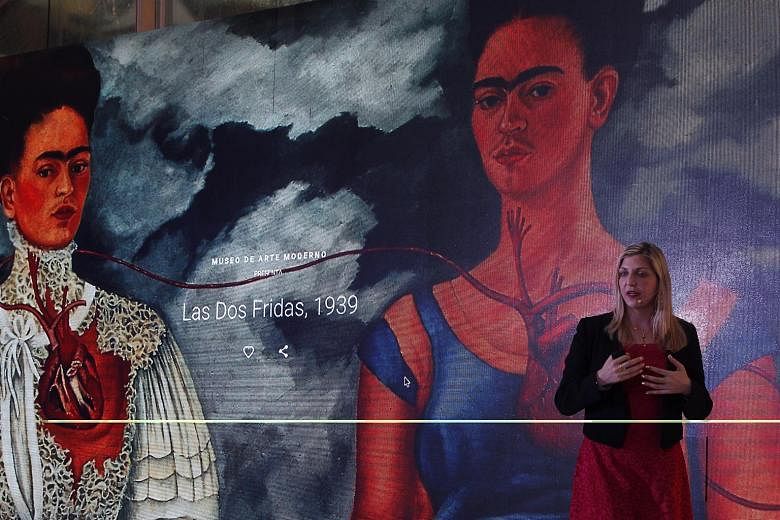MEXICO CITY • Google the name Frida Kahlo and you will find out that, in contrast with many famous male artists, the Mexican artist is known more for her appearance than her work.
Her identity is linked to her coil of dark braids, colourful Mexican dress and a signature unibrow.
But Google itself wants to change that perception even as 63 years after her death in 1954, Kahlo has achieved a level of fame she never reached in her lifetime, with her image emblazoned on mugs, T-shirts, keychains and even underwear.
But scholars and the painter's descendants lament that she has been reduced to a set of distinctive physical features that often overshadow her actual work.
The debate heated up this spring when American toymaker Mattel released a Barbie in Kahlo's image, despite protests from her family.
The Barbie and other merchandise do not capture Kahlo's complex legacy as a feminist icon, a disabled woman who channelled her pain into art, an ardent communist and an inspiration to the LGBT (lesbian, gay, bisexual and transgender) community, scholars noted.
"Frida Kahlo is not a product or a brand... Frida Kahlo is not a doll," said photographer Cristina Kahlo, the artist's great-grandniece.
"For us, it is important to maintain the image of Frida Kahlo as the painter that she was."
This month, a new project aims to return the focus to her art.
Alphabet's Google, working in collaboration with the Kahlo family, has dedicated a portion of its Arts and Culture app to the artist's life and work.
The search giant partnered with 33 museums to digitise her most famous paintings and bring new work into the public eye.
The app also features rare letters, diary entries and sketches, in addition to a virtual tour of her famous blue home in Mexico City.
The Kahlo family played an active role. American artist Alexa Meade and Mexican musician Ely Guerra also collaborated on a piece of "living art" honouring Kahlo, working under her great-grandniece's guidance.
"These projects that are related to Frida from a cultural point of view, spreading her painting, works and story... are projects I like and feel comfortable participating in," her great-grandniece said.
Google said that no money changed hands.
While Kahlo's husband, artist Diego Rivera, had established a trust supervised by the Banco de Mexico to operate museums dedicated to the couple's work, management of her brand and image is more contentious.
In the early 2000s, one of her nieces - Ms Isolda Pinedo and her daughter Mara Romeo - assigned rights to the Kahlo brand to a company known as the Frida Kahlo Corporation, according to court papers.
Tension boiled over in March when Mattel released a Kahlo Barbie, licensed by the corporation.
In a case launched by family members, a Mexican civil court judge issued a preliminary injunction blocking the sale of the doll and other products licensed by the corporation in Mexico.
Mattel asked a federal court to lift the injunction and a ruling is expected next month, a spokesman for the toymaker said.
"This Barbie doll is meant to honour Frida Kahlo's great legacy and we hope it will be back on shelves in Mexico soon," Mattel said in a statement.
Mr Pablo Sangri Gil, a lawyer for Ms Romeo, told Reuters that the Barbie was an example of the Frida Kahlo Corporation operating without consulting with the family, in violation of the rights agreement.
In turn, the corporation sued Ms Romeo this month in a Florida federal court, alleging that she violated the contract by licensing Kahlo-branded products of her own.
Mr Gil said he had not been formally notified of the Florida lawsuit.
The feud underscores the challenges of managing celebrity legacies, said Mr Jonathan Faber, chief executive of Luminary Group, a licensing firm.
Guitarist Jimi Hendrix's family battled over his image, licensing duelling products.
A memorial fund for Princess Diana tried to block Franklin Mint from selling dolls and other memorabilia modelled after the royal, but an American court ultimately allowed the products to stay on shelves.
Kahlo, who died at 47, gained greater prominence with the publication of a landmark biography in the early 1980s and her popularity has only grown since.
Scholars welcome a return to the focus on art. Kahlo "has become a Halloween costume", said Ms Oriana Baddeley, a professor at the University of the Arts London.
Ms Charlene Villasenor Black, an art history professor at the University of California, Los Angeles, said there was irony in Kahlo's reincarnation at the hands of Mattel.
"How many other communist Barbie dolls are there?" she added.
REUTERS

